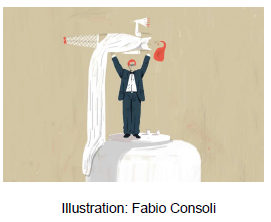Questões de Vestibular Sobre inglês
Foram encontradas 5.992 questões

Disponível em <http://comicskingdom.com/blog/2014/12/02/tuesday-s-top-ten-comics-holiday-shopping-gift-giving>Acesso em: 15 nov. 2017.
Brazil must legalise drugs – its existing policy just destroys lives
For decades, guns and imprisonment have been the hallmarks of Brazil’s war against the drug trafficking. But the only way to beat the gangs is to stop creating criminals, says a top Brazilian judge
“The war raging in Rocinha, Latin America’s largest favela, has already been lost. Rooted in a dispute between gangs for control of drug trafficking, it has disrupted the daily life of the community in Rio de Janeiro since mid-September. With the sound of shots coming from all sides, schools and shops are constantly forced to close. Recently, a stray bullet killed a Spanish tourist. The war is not the only thing being lost.
For decades, Brazil has had the same drug policy approach. Police, weapons and numerous arrests. It does not take an expert to conclude the obvious: the strategy has failed. Drug trafficking and consumption have only increased. […]
In a case still before the Brazilian supreme court, I voted for decriminalising the possession of marijuana for private consumption. […]
Drugs are an issue that has a profound impact on the criminal justice system, and it is legitimate for the supreme court to participate in the public debate. So here are the reasons for my views.
First, drugs are bad and it is therefore the role of the state and society to discourage consumption, treat dependents and repress trafficking. The rationale behind legalisation is rooted in the belief that it will help in achieving these goals.
Second, the war on drugs has failed. Since the 1970s, under the influence and leadership of the US, the world has tackled this problem with the use of police forces, armies, and armaments. The tragic reality is that 40 years, billions of dollars, hundreds of thousands of prisoners and thousands of deaths later, things are worse. At least in countries like Brazil.
Third, as the American economist Milton Friedman argued, the only result of criminalisation is ensuring the trafficker’s monopoly.
With these points in mind, what would legalisation achieve?
In most countries in North America and Europe, the greatest concern of the authorities is users and the impact drugs have on their lives and on society. These are all important considerations. In Brazil, however, the principal focus must be ending the dominance drug dealers exercise over poor communities. Gangs have become the main political and economic power in thousands of modest neighbourhoods in Brazil. This scenario prevents a family of honest and hard-working people from educating their children away from the influence of criminal factions, who intimidate, co-opt and exercise an unfair advantage over any lawful activity. Crucially, this power of trafficking comes from illegality.
Another benefit of legalisation would be to prevent the mass incarceration of impoverished young people with no criminal record who are arrested for trafficking because they are caught in possession of negligible amounts of marijuana. A third of detainees in Brazil are imprisoned for drug trafficking. Once arrested, young prisoners will have to join one of the factions that control the penitentiaries – and on that day, they become dangerous.
[…]
We cannot be certain that a progressive and cautious policy of decriminalisation and legalisation will be successful. What we can affirm is that the existing policy of criminalisation has failed. We must take chances; otherwise, we risk simply accepting a terrible situation. As the Brazilian navigator Amyr Klink said: “The worst shipwreck is not setting off at all.”
Disponível em: <https://www.theguardian.com/global-development/2017/nov/15/brazil-must-legalise-drugs-existing-policy-destroys-lives-luis-roberto-barroso-supreme-court-judge>
Brazil must legalise drugs – its existing policy just destroys lives
For decades, guns and imprisonment have been the hallmarks of Brazil’s war against the drug trafficking. But the only way to beat the gangs is to stop creating criminals, says a top Brazilian judge
“The war raging in Rocinha, Latin America’s largest favela, has already been lost. Rooted in a dispute between gangs for control of drug trafficking, it has disrupted the daily life of the community in Rio de Janeiro since mid-September. With the sound of shots coming from all sides, schools and shops are constantly forced to close. Recently, a stray bullet killed a Spanish tourist. The war is not the only thing being lost.
For decades, Brazil has had the same drug policy approach. Police, weapons and numerous arrests. It does not take an expert to conclude the obvious: the strategy has failed. Drug trafficking and consumption have only increased. […]
In a case still before the Brazilian supreme court, I voted for decriminalising the possession of marijuana for private consumption. […]
Drugs are an issue that has a profound impact on the criminal justice system, and it is legitimate for the supreme court to participate in the public debate. So here are the reasons for my views.
First, drugs are bad and it is therefore the role of the state and society to discourage consumption, treat dependents and repress trafficking. The rationale behind legalisation is rooted in the belief that it will help in achieving these goals.
Second, the war on drugs has failed. Since the 1970s, under the influence and leadership of the US, the world has tackled this problem with the use of police forces, armies, and armaments. The tragic reality is that 40 years, billions of dollars, hundreds of thousands of prisoners and thousands of deaths later, things are worse. At least in countries like Brazil.
Third, as the American economist Milton Friedman argued, the only result of criminalisation is ensuring the trafficker’s monopoly.
With these points in mind, what would legalisation achieve?
In most countries in North America and Europe, the greatest concern of the authorities is users and the impact drugs have on their lives and on society. These are all important considerations. In Brazil, however, the principal focus must be ending the dominance drug dealers exercise over poor communities. Gangs have become the main political and economic power in thousands of modest neighbourhoods in Brazil. This scenario prevents a family of honest and hard-working people from educating their children away from the influence of criminal factions, who intimidate, co-opt and exercise an unfair advantage over any lawful activity. Crucially, this power of trafficking comes from illegality.
Another benefit of legalisation would be to prevent the mass incarceration of impoverished young people with no criminal record who are arrested for trafficking because they are caught in possession of negligible amounts of marijuana. A third of detainees in Brazil are imprisoned for drug trafficking. Once arrested, young prisoners will have to join one of the factions that control the penitentiaries – and on that day, they become dangerous.
[…]
We cannot be certain that a progressive and cautious policy of decriminalisation and legalisation will be successful. What we can affirm is that the existing policy of criminalisation has failed. We must take chances; otherwise, we risk simply accepting a terrible situation. As the Brazilian navigator Amyr Klink said: “The worst shipwreck is not setting off at all.”
Disponível em: <https://www.theguardian.com/global-development/2017/nov/15/brazil-must-legalise-drugs-existing-policy-destroys-lives-luis-roberto-barroso-supreme-court-judge>
Brazil must legalise drugs – its existing policy just destroys lives
For decades, guns and imprisonment have been the hallmarks of Brazil’s war against the drug trafficking. But the only way to beat the gangs is to stop creating criminals, says a top Brazilian judge
“The war raging in Rocinha, Latin America’s largest favela, has already been lost. Rooted in a dispute between gangs for control of drug trafficking, it has disrupted the daily life of the community in Rio de Janeiro since mid-September. With the sound of shots coming from all sides, schools and shops are constantly forced to close. Recently, a stray bullet killed a Spanish tourist. The war is not the only thing being lost.
For decades, Brazil has had the same drug policy approach. Police, weapons and numerous arrests. It does not take an expert to conclude the obvious: the strategy has failed. Drug trafficking and consumption have only increased. […]
In a case still before the Brazilian supreme court, I voted for decriminalising the possession of marijuana for private consumption. […]
Drugs are an issue that has a profound impact on the criminal justice system, and it is legitimate for the supreme court to participate in the public debate. So here are the reasons for my views.
First, drugs are bad and it is therefore the role of the state and society to discourage consumption, treat dependents and repress trafficking. The rationale behind legalisation is rooted in the belief that it will help in achieving these goals.
Second, the war on drugs has failed. Since the 1970s, under the influence and leadership of the US, the world has tackled this problem with the use of police forces, armies, and armaments. The tragic reality is that 40 years, billions of dollars, hundreds of thousands of prisoners and thousands of deaths later, things are worse. At least in countries like Brazil.
Third, as the American economist Milton Friedman argued, the only result of criminalisation is ensuring the trafficker’s monopoly.
With these points in mind, what would legalisation achieve?
In most countries in North America and Europe, the greatest concern of the authorities is users and the impact drugs have on their lives and on society. These are all important considerations. In Brazil, however, the principal focus must be ending the dominance drug dealers exercise over poor communities. Gangs have become the main political and economic power in thousands of modest neighbourhoods in Brazil. This scenario prevents a family of honest and hard-working people from educating their children away from the influence of criminal factions, who intimidate, co-opt and exercise an unfair advantage over any lawful activity. Crucially, this power of trafficking comes from illegality.
Another benefit of legalisation would be to prevent the mass incarceration of impoverished young people with no criminal record who are arrested for trafficking because they are caught in possession of negligible amounts of marijuana. A third of detainees in Brazil are imprisoned for drug trafficking. Once arrested, young prisoners will have to join one of the factions that control the penitentiaries – and on that day, they become dangerous.
[…]
We cannot be certain that a progressive and cautious policy of decriminalisation and legalisation will be successful. What we can affirm is that the existing policy of criminalisation has failed. We must take chances; otherwise, we risk simply accepting a terrible situation. As the Brazilian navigator Amyr Klink said: “The worst shipwreck is not setting off at all.”
Disponível em: <https://www.theguardian.com/global-development/2017/nov/15/brazil-must-legalise-drugs-existing-policy-destroys-lives-luis-roberto-barroso-supreme-court-judge>
Brazil must legalise drugs – its existing policy just destroys lives
For decades, guns and imprisonment have been the hallmarks of Brazil’s war against the drug trafficking. But the only way to beat the gangs is to stop creating criminals, says a top Brazilian judge
“The war raging in Rocinha, Latin America’s largest favela, has already been lost. Rooted in a dispute between gangs for control of drug trafficking, it has disrupted the daily life of the community in Rio de Janeiro since mid-September. With the sound of shots coming from all sides, schools and shops are constantly forced to close. Recently, a stray bullet killed a Spanish tourist. The war is not the only thing being lost.
For decades, Brazil has had the same drug policy approach. Police, weapons and numerous arrests. It does not take an expert to conclude the obvious: the strategy has failed. Drug trafficking and consumption have only increased. […]
In a case still before the Brazilian supreme court, I voted for decriminalising the possession of marijuana for private consumption. […]
Drugs are an issue that has a profound impact on the criminal justice system, and it is legitimate for the supreme court to participate in the public debate. So here are the reasons for my views.
First, drugs are bad and it is therefore the role of the state and society to discourage consumption, treat dependents and repress trafficking. The rationale behind legalisation is rooted in the belief that it will help in achieving these goals.
Second, the war on drugs has failed. Since the 1970s, under the influence and leadership of the US, the world has tackled this problem with the use of police forces, armies, and armaments. The tragic reality is that 40 years, billions of dollars, hundreds of thousands of prisoners and thousands of deaths later, things are worse. At least in countries like Brazil.
Third, as the American economist Milton Friedman argued, the only result of criminalisation is ensuring the trafficker’s monopoly.
With these points in mind, what would legalisation achieve?
In most countries in North America and Europe, the greatest concern of the authorities is users and the impact drugs have on their lives and on society. These are all important considerations. In Brazil, however, the principal focus must be ending the dominance drug dealers exercise over poor communities. Gangs have become the main political and economic power in thousands of modest neighbourhoods in Brazil. This scenario prevents a family of honest and hard-working people from educating their children away from the influence of criminal factions, who intimidate, co-opt and exercise an unfair advantage over any lawful activity. Crucially, this power of trafficking comes from illegality.
Another benefit of legalisation would be to prevent the mass incarceration of impoverished young people with no criminal record who are arrested for trafficking because they are caught in possession of negligible amounts of marijuana. A third of detainees in Brazil are imprisoned for drug trafficking. Once arrested, young prisoners will have to join one of the factions that control the penitentiaries – and on that day, they become dangerous.
[…]
We cannot be certain that a progressive and cautious policy of decriminalisation and legalisation will be successful. What we can affirm is that the existing policy of criminalisation has failed. We must take chances; otherwise, we risk simply accepting a terrible situation. As the Brazilian navigator Amyr Klink said: “The worst shipwreck is not setting off at all.”
Disponível em: <https://www.theguardian.com/global-development/2017/nov/15/brazil-must-legalise-drugs-existing-policy-destroys-lives-luis-roberto-barroso-supreme-court-judge>
Brazil must legalise drugs – its existing policy just destroys lives
For decades, guns and imprisonment have been the hallmarks of Brazil’s war against the drug trafficking. But the only way to beat the gangs is to stop creating criminals, says a top Brazilian judge
“The war raging in Rocinha, Latin America’s largest favela, has already been lost. Rooted in a dispute between gangs for control of drug trafficking, it has disrupted the daily life of the community in Rio de Janeiro since mid-September. With the sound of shots coming from all sides, schools and shops are constantly forced to close. Recently, a stray bullet killed a Spanish tourist. The war is not the only thing being lost.
For decades, Brazil has had the same drug policy approach. Police, weapons and numerous arrests. It does not take an expert to conclude the obvious: the strategy has failed. Drug trafficking and consumption have only increased. […]
In a case still before the Brazilian supreme court, I voted for decriminalising the possession of marijuana for private consumption. […]
Drugs are an issue that has a profound impact on the criminal justice system, and it is legitimate for the supreme court to participate in the public debate. So here are the reasons for my views.
First, drugs are bad and it is therefore the role of the state and society to discourage consumption, treat dependents and repress trafficking. The rationale behind legalisation is rooted in the belief that it will help in achieving these goals.
Second, the war on drugs has failed. Since the 1970s, under the influence and leadership of the US, the world has tackled this problem with the use of police forces, armies, and armaments. The tragic reality is that 40 years, billions of dollars, hundreds of thousands of prisoners and thousands of deaths later, things are worse. At least in countries like Brazil.
Third, as the American economist Milton Friedman argued, the only result of criminalisation is ensuring the trafficker’s monopoly.
With these points in mind, what would legalisation achieve?
In most countries in North America and Europe, the greatest concern of the authorities is users and the impact drugs have on their lives and on society. These are all important considerations. In Brazil, however, the principal focus must be ending the dominance drug dealers exercise over poor communities. Gangs have become the main political and economic power in thousands of modest neighbourhoods in Brazil. This scenario prevents a family of honest and hard-working people from educating their children away from the influence of criminal factions, who intimidate, co-opt and exercise an unfair advantage over any lawful activity. Crucially, this power of trafficking comes from illegality.
Another benefit of legalisation would be to prevent the mass incarceration of impoverished young people with no criminal record who are arrested for trafficking because they are caught in possession of negligible amounts of marijuana. A third of detainees in Brazil are imprisoned for drug trafficking. Once arrested, young prisoners will have to join one of the factions that control the penitentiaries – and on that day, they become dangerous.
[…]
We cannot be certain that a progressive and cautious policy of decriminalisation and legalisation will be successful. What we can affirm is that the existing policy of criminalisation has failed. We must take chances; otherwise, we risk simply accepting a terrible situation. As the Brazilian navigator Amyr Klink said: “The worst shipwreck is not setting off at all.”
Disponível em: <https://www.theguardian.com/global-development/2017/nov/15/brazil-must-legalise-drugs-existing-policy-destroys-lives-luis-roberto-barroso-supreme-court-judge>
by Lisa Eadicicco
Regina Dugan, Facebook's vice president of engineering and head of its secretive Building 8, the future is full of revolutionary technologies that will enable us to communicate without typing keys, tapping screens, or even talking.
Dressed in a dark Steve Jobs-like turtleneck, Dugan announced Wednesday that Facebook has a team of 60 people working on a computer interface powered by the human brain. The system would be capable of "typing" 100 words per minute by decoding users' neural activity, which is five times faster than we're able to type on smartphones. Facebook says the technology could be useful as an input tool for augmented reality devices, or as an aide for people with communication disorders.
Disponível em: <http://time.com/4747050/facebook-f8-day-2-keynote/>. Acesso em: 23 abr. 2017.
Com base no texto, pode-se afirmar que o Facebook
Most Teens Take a Voluntary Week-Long Break From Social Media
by Barbara Ortutay
The common stereotype has teens glued to their phones 24-7. But nearly 60 percent of teens in the U.S. have actually taken a break from social media — the bulk of them voluntarily, a new survey found. The poll, from The Associated Press-NORC Center for Public Affairs Research, surveyed teens aged 13 to 17 and found that most value the feeling of connection with friends and family that social media provides. A much smaller number associate it with negative emotions, such as being overwhelmed or needing to always show their best selves. The survey, released Thursday, found that teens' social media breaks are typically a week or longer, and that boys are more likely to take longer breaks.
Disponível em: <http://time.com/4758172/teenagers-social-media-break-survey/>. Acesso em: 23 abr. 2017.
De acordo com o texto, pode-se inferir que
by Eva Hershaw
Chinese scientists have transplanted the head of a donor rat onto the back of a host body, creating an equally garish and impressive two-headed rat that may offer insights into the viability of an eventual human head transplant.
The process, which was done by way of a rat triad, which included a donor, recipient, and blood supply rat, provided a continuous blood supply to the donor brain throughout the transplant, avoiding brain tissue hypothermia — a condition where the brain suffers in absence of a blood supply. The problem has long been one of the major barriers to carrying out a successful head transplant in animal specimens.
Disponível em: <https://www.seeker.com/health/medicine/surgeons-conduct-head-transplants-on-rats-sayhumans-are-next>. Acesso em: 23 abr. 2017.
Com base no texto, é possível afirmar que
I. um transplante de cabeça foi realizado em ratos. II. cientistas planejam transplantar cabeça em humanos. III. o rato que recebeu o transplante não sobreviveu. IV. o rato teve sua cabeça substituída por uma outra. V. dois ratos foram usados no procedimento descrito.
Assinale a alternativa que apresenta apenas afirmativas corretas.
by Rossella Lorenzi
Researchers investigating a 14th century burial ground have identified a rare case of "coffin birth" - a gruesome phenomenon in which a deceased pregnant woman's fetus is expelled within the grave. The event, which has seldom been reported in archaeology, is known as postmortem fetal extrusion. It results from a build-up of gas pressure within the decomposing body. "In this case, we have a partial expulsion of a 38- to 40-week-old fetus, which was found to be complete and to lie within the birth canal," Deneb Cesana, at the University of Genova, told Seeker.
Disponível em: <https://www.seeker.com/coffin-birth-found-in-black-death-burial-2333620306.html>. Acesso em: 23 abr. 2017.
Com base no texto, é correto afirmar que

Disponível em: <http://www.callouscomics.com/index/14-november-2014>. Acesso em: 22 abr. 2017.
Sobre a tirinha, pode-se concluir que o homem
SpaceX launched a top-secret spy satellite for the U.S. government Monday morning and then successfully landed the booster for recycling. The unmanned Falcon 9 rocket lifted off from its NASA-leased pad at Kennedy Space Center in Florida. It was SpaceX's first mission for the National Reconnaissance Office. No details were divulged about the newly launched NRO satellite. Instead, SpaceX focused its webcast on the successful touchdown of the first-stage booster. The leftover booster — its job done — landed at Cape Canaveral Air Force Station several minutes after liftoff. Sonic booms rattled the area, serving as a Monday morning wake-up call. Across the country, cheers erupted at SpaceX Mission Control at company headquarters in Hawthorne, California. SpaceX strives to return most of its boosters for reuse.
The company's first recycled rocket flew last month. This was the fourth SpaceX booster landing at Cape Canaveral; even more have landed on ocean platforms.
Disponível em: <http://www.cbc.ca/news/technology/spacex-launches-spy-satellite-1.4093085>. Acesso em: 23 abr. 2017.
According to the text,
I. SpaceX is a technology company which launches satellites. II. Falcon 9 is a new top-secret U.S. government spy satellite. III. present technology allows for the use of recycled rockets. IV. the satellite was launched in secrecy from Hawthorne, California. V. NRO and SpaceX have worked on previous satellite projects.
Assinale a alternativa que apresenta apenas afirmativas corretas.
by Alexa Erickson
Breakfast is the most important meal of the day, right? So why not have two? There’s a growing trend promoting a “second breakfast” as a weight-loss mechanism. The idea: If you eat more in the morning, you’ll be less likely to snack at night, when, according to research, it’s harder to burn off calories. Now there’s research adding weight to this claim.
A study conducted by researchers at Yale and the University of Connecticut suggests that eating something small to jump-start your metabolism followed by a slightly larger meal an hour or two later can keep you satiated until lunchtime and help prevent overeating throughout the rest of the day. The study, published in the journal Pediatric Obesity, tracked the weight and breakfast-eating patterns of students from 12 randomly selected urban area schools over the course of two years. The team looked at six different eating patterns: frequent breakfast skippers, inconsistent school eaters, inconsistent home eaters, frequent school eaters, frequent home eaters, and double-breakfast eaters. They found that it was the frequent breakfast skippers who showed increased odds of becoming overweight or obese compared to the double-breakfast eaters.
Disponível em: <http://www.rd.com/health/diet-weight-loss/could-eating-second-breakfast-help-you-lose-weight/>. Acesso em: 23 abr. 2017.
De acordo com o texto,
I. tomar café da manhã em duas etapas parece ajudar a perder peso. II. pessoas que não tomam café com frequência tendem a ser magras. III. este estudo avalia hábitos alimentares de 12 grupos de estudantes. IV. os pesquisadores acham que é mais difícil perder peso à noite. V. aqueles que comem mais de manhã tendem a comer menos à noite.
Assinale a alternativa que apresenta apenas afirmativas corretas.
Über-Adaptable Airless Tires
By Lisa Eadicicco
In the future, our cars will be smart, and our tires will be smarter. For starters, it’s airless, eliminating the need to worry about pounds per square inch. It’s also made from recycled materials in an effort to reduce waste. But the most impressive feature may be its 3-D--printed treads, which can be swapped in and out to accommodate various road conditions—without changing the tire itself. The challenge will be figuring out a way to do it quickly, says Terry Gettys, who helped lead the project, “because consumers are going to want their tires [ready to go] in just a few minutes.”

One of the most innovative features of this new concept tire is that it
A Shoe Engineered to Boost Performance
By Julia Zorthian
Imagine a shoe that lets you run faster, pivot better and jump higher. That’s the idea behind the Futurecraft 4D, a new sneaker whose midsole can be expertly tailored to the needs of its wearers—not only in size and shape, but also in flexibility, impact type, cushioning and more. The key is the 3-D printing process, which enables the company to “look at every single square millimeter of a midsole and tune it from a performance standpoint,” says Al VanNoy, who headed the project. It would take weeks to make those modifications using traditional shoemaking methods. But the Futurecraft 4D midsoles can be printed in as little as two hours, meaning they could even be produced in stores. At least that’s a possibility for the future.

Disponı́vel em: <http://time.com>. Acesso em: 25 mar. 2018.
Based on the text, Futurecraft 4D
Novelist and travel journalist Jo Piazza on the benefits of competing in the wife-carrying race
You don’t hear that enough in life. But it was the first thing my husband and I were told after flying across the country to Sunday River, Maine, to enter the North American Wife Carrying Championship. Never heard of wife carrying? You’re forgiven. Popular in Finland as Eukonkanto and legally dubbed a “sport” there in 1991, wife carrying is a race wherein a man hurls a woman over his shoulders as if she were a sack of potatoes and stumbles through and over obstacles to cross a finish line and collect his prize— his wife’s weight in beer. Yes, that’s the prize.
We also learned that there are well-thought-out wife-carrying techniques, the most popular being the “Estonian carry,” whereby the woman hangs upside down behind her husband facing his butt, with her legs thrown over his shoulders. It’s as uncomfortable as it sounds.

Disponı́vel em: <https://americanwaymagazine.com>. Acesso em: 25 mar. 2018.
De acordo com o texto,
I. a mulher é carregada como se fosse um saco de batatas. II. EukonKanto é considerado um esporte praticado nos EUA. III. o esposo deve carregar sua esposa acima de sua cabeça. IV. cerveja equivalente ao peso da esposa é o prêmio ofertado. V. segurança e conforto da mulher são critérios fundamentais.
Assinale a alternativa que apresenta apenas afirmativas corretas.
“Weird.” “Curious.” “Baffling.” “Quite Stupid.” These words all once described Alexa, the voice-activated digital assistant on Amazon’s Echo device. But Amazon says the Echo Dot, a smaller, less expensive version of the Echo, was its “top-selling device” during the holiday season.
In 2014, it was odd to even consider owning an Echo — and impossible to buy without an invitation from Amazon. Today, you can pick from five Echo models. Or, you can try Google’s version: the Google Home, Google Home Mini or Google Home Max. Apple has also released a digital assistant device, the HomePod, which is fully capable with Siri. You can have your pick of digital assistants — each with varying capabilities of improving your life.
Alexa now has more than 15,000 skills, meaning any Echo device can go beyond describing the weather or playing music. The Google Assistant, first released in 2016, is catching up.
So why buy one now? First, they’re relatively inexpensive and far easier to use and understand than they were when first released. Think back to MP3 players or early smartphones: people learned a lot about using the products and became so adjusted to them that they didn’t know how to go back. Second, the future is paved with smart home devices, and voice-activated assistants to control them are becoming ubiquitous. The Echo and Google Home are no longer “test products” — the companies behind them want them to last.
Disponı́vel em: <www.nytimes.com>. Acesso em: 10 mar. 2018
Com base no texto, afirma-se que
I. existem vários modelos de assistentes digitais ativados por voz no mercado. II. Alexa ainda é bastante limitada, mas descreve o tempo e toca músicas., III. Google, Apple e Amazon desenvolveram assistentes digitais em parceria. IV. há justificativas para a compra de um Echo Dot ou de um Google Home. V. alguns dos assistentes digitais mencionados ainda se encontram em fase de testes.
Assinale a alternativa que apresenta apenas afirmativas corretas.
Nuclear bombs can destroy us. Facebook undermines our privacy. Artificial intelligence (AI) and robots can enslave us (or, worse, take our jobs). Synthetic biology and geneediting have humans playing God. Social media make us depressed: we’ve never been so connected yet never so alone.
Those are just a few of the complaints leveled against technology. For most of human history, however, technology was mostly seen as a force for good. More people would live because of technical progress, from refrigeration to vaccination, than perish because of it, despite lethal inventions such as gunpowder.

Disponı́vel em: <https://www.economist.com >. Acesso em: 25 mar. 2018.
After reading this text, one could state that

Disponı́vel em: <http://time.com>. Acesso em: 24 abr. 2018.
De acordo com o texto, infere-se que